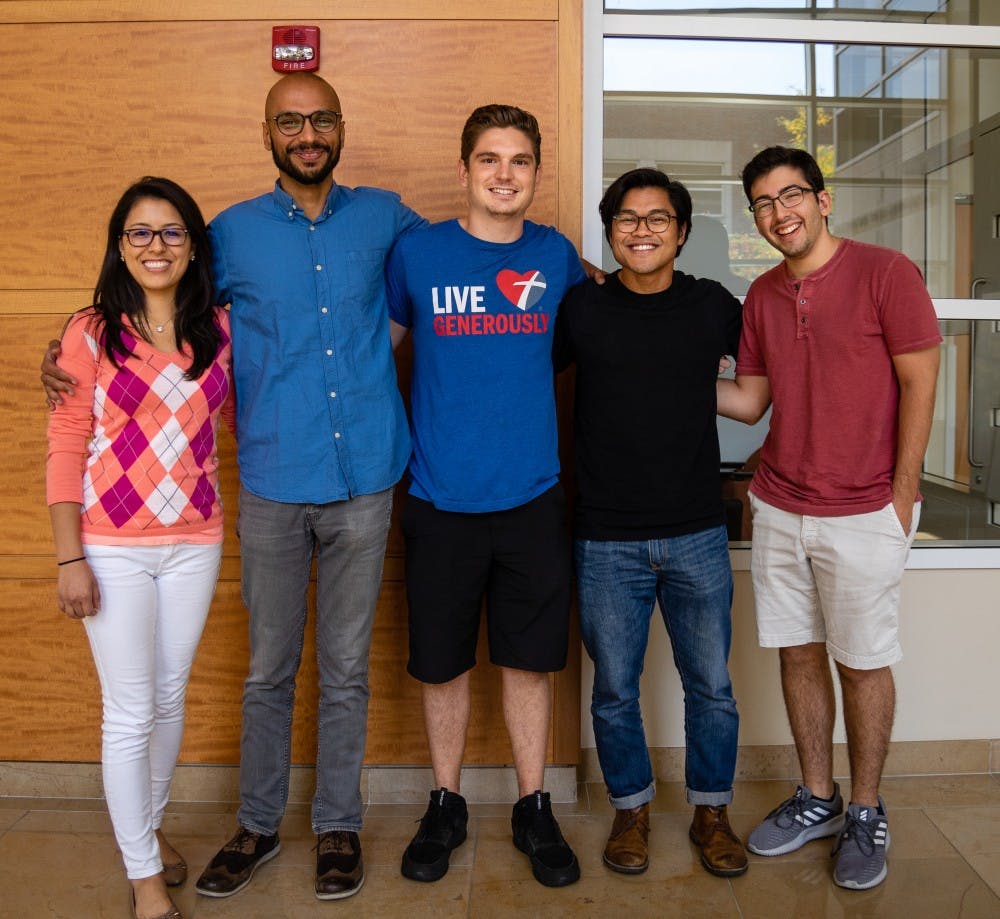Healthy Aging Initiative provides free healthcare to geriatric patients in Mid-Michigan.

(From left to right) Shing Chao, Kultaj Kaleka, Jonathon Skurya, Sean-Matthew Calo and Derek Wolfe pose for a photo on Sept. 4 in the Health Professions Building. The second-year medical students are coordinating the Health Aging Initiative, which is scheduled to start in mid-September.
Healthcare for the geriatric patients who live in rural regions isn't always affordable or available. That's why a Central Michigan University professor and team of medical students created a project to provide free care to this population.
“Being in a rural area, you don’t have as much access to healthcare,” said Jonathon Skurya, a medical student from Macomb. “For my grandma, it would take over a year to get a new appointment with a doctor.”
Pathology professor Jyotsna Pandy and five second-year medical students created the Healthy Aging Initiative, a program where Central Michigan University medical students to provide free health screenings for geriatric patients in Clare, Gratiot and Isabella county.
The project started in January 2018. It is led by Pandy, who received a $422,000 grant to fund the project. Since January, she and the medical students have met weekly to plan the project.
The group’s goal is to promote “healthy aging” in the geriatric community and create a replicable program for other medical schools around the country, said California medical student Kultaj Kaleka.
Maintaining one's health for as long as possible is the goal of healthy aging.
“Healthy aging is making sure we have the proper resources and awareness to stay healthy as we get older,” said Trenton medical student Sean-Matthew Calo.
Derek Wolfe, West Bloomfield medical student, said healthy aging is about keeping older people independent.
“You want to age with dignity, and part of that is being able to stay where you live for as long as possible,” Wolfe said.
Many risks are present when senior citizens live at home. These include risk for falling, social isolation, depression and substance abuse, Kaleka said.
“There’s a lot of things that we can do if we’re aware of (these risks) that can either slow the progression of some of these age-related issues or just help them and make sure that they don’t get worse,” Calo said.
The project is going to serve 104 patients 60 years and older. The home visits are scheduled to start mid-September.
On these visits, the students will assess for substance abuse, social isolation, blood pressure, medication conflicts, oral hygiene and fall risk, Kaleka said.
To help prevent these issues, every second-year medical student along with nursing, social work, pharmacy and physical therapy students will be visiting the home of a geriatric patient in the program.
The students said their major concern for the patients is balance.
Students will use a balance assessment to evaluate a patient's risk for fall. The test requires patients to stand up and sit back down at least 12 times in 30 seconds. Another balance test has patients walk in a straight line while students evaluate their posture.
If a patient is at risk for falls, a physical therapy student will provide exercises for the patient.
“One big thing that can help with fall risk is implementing exercise programs to really help strengthen muscle and bone density,” Skurya said.
Teams will bring a food basket with them on each visit, in case patients cannot afford food. Social work students will connect patients with resources that can supply food, Wolfe said.
One of the benefits of this project is students will gain professional practice with the geriatric population.
“This is a really important project because the need for people who take care of the older adult population is frankly dire,” Wolfe said. If even one student goes through the program and decides to work with the geriatric population, that's a gain, he said.



